Munir al-Ajlani
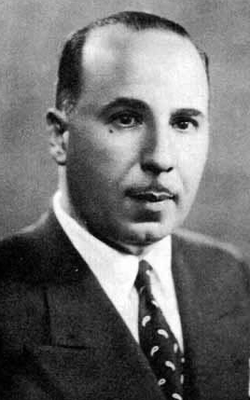
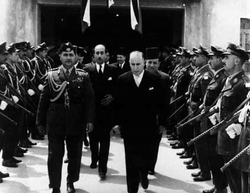

Munir al-Ajlani (Dr. Munir Ajlani, منير محمد علي العجلاني) (August 1912 or 1914 – June 2004) (nationality: Syrian/Saudi) was a politician, writer, lawyer, and scholar. He made history as the youngest Syrian minister. He received his doctorate at a very young age from La Sorbonne University in Paris.
Biography
Marriage: Munir al-Ajlani married Inam al-Hasani, daughter of president Taj al-Din al-Hasani, in 1943.
Children: Manar al-Ajlani, Fawaz al-Ajlani, Amir al-Ajlani, Nawara al-Ajlani, and Munira al-Ajlani.
Debatable date of birth
Some sources say that Ajlani was born in 1904. It is believed that al-Ajlani changed his date of birth on official records to be considered for parliament at an early age.
Family history and controversy
The Ajlani family's origin goes back to the Ashraf of Saudi Arabia. Their descendants travelled and settled in Damascus at the time when Damascus was a center for knowledge. Dr Munir Al-Ajlani was born into this family of academic and material wealth. The Ajlani family became one of the most well-known and wealthiest families in Syria.
Education
Ajlani, born into an upper-class family that owned much land, followed in his family's footsteps. He studied at the University of Damascus then continued his studies in Paris where he earned his Phd from La Sorbonne University. Ajlani studied law and obtained a minor degree in literature and linguistics.
Bibliography
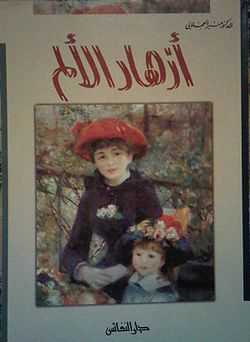
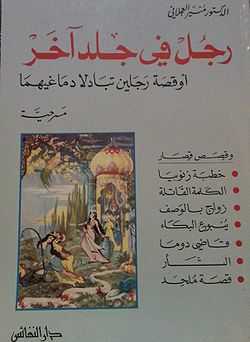
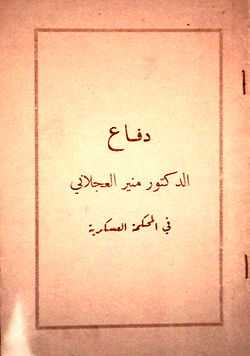
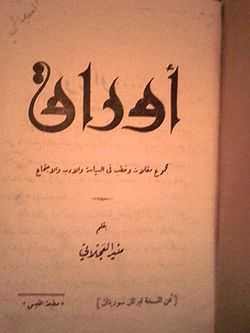
• آوراق (Papers)
• عبقرية الاسلام في آصول الحكم (The Genius of Islam in Governing)
• الحقوق الرومانية، الدستورية
• آزهار الألم (Poetry Book Flowers of Pain)
• رجل في جلد آخر (A Man in Another Man's Skin)
• عجائب الدنيا السبع (The Seven Wonders of the World)
• فيصل
• La constitution de la Syrie
• معاوية، عائشة، زنوبية
• Prelude to Nizar Qabbani's first set of poems in 1944 entitled: "The Brunette Said to Me"
Politics
Youngest deputy fights for independence
Munir al-Ajlani returned to Damascus in 1936, changed his age in official records, and nominated himself for Parliament, winning a seat at the age of 22. He became the youngest deputy in Syrian history. He wrote frequently for the Damascus daily al-Qabas and founded his own newspaper with the attorney Sami Kabbara called al-Nidal. In 1934, he joined the National Bloc, the leading anti-French movement in Syria, and in 1936 ran for Parliament on a Bloc ticket. He nominated himself for Parliament again in 1943, 1947, 1949, and 1954, winning in every round with a majority vote in Damascus. Once in Parliament, Ajlani joined with Sayf al-Din al-Ma'mun, another prominent young lawyer, and co-founded the Steel Shirts, a military youth force modeled after the Black Shirts in Italy and the Brown Shirts in Germany. The Steel Shirts aimed at protecting locals from French aggression and mobilizing support for the National Bloc. Its leaders were a group of young men who wanted to introduce the concept of disciplined and armed resistance to occupation. The Steel Shirts wore an armband showing a torch bearing hand. Among the party's co-founders were the university professor Ahmad al-Samman, and the National Bloc leader Fakhri al-Barudi. The Steel Shirts remained in charge of Syrian mass politics during the years 1936–1946 and was disbanded by its own leaders when Syrian independence was achieved in 1946. The Steel Shirts transformed Ajlani into a youth leader in Damascus.
Becoming the Minister of education
In 1939, Turkey annexed the Sanjak of Alexanderetta, territory in northern Syria that had once belonged to the Ottoman Empire. Ajlani resigned from party office to protest the National Bloc's inability of preventing the annexation. He became a member of the opposition, headed by Dr. Abd al-Rahman Shahbandar, and engaged in anti-Bloc activity for the remainder of the 1930s. When agents of the French killed Shahbandar in 1940, Ajlani allied himself with Sheikh Taj al-Din al-Hasani, a hard-line opponent of the National Bloc and an ally of Paris. Ajlani married his daughter Inaam, and when Hasani was appointed President of the Republic by General Charles de Gaulle in 1941, he appointed him Secretary-General of the Presidential Palace. The following year, Hasani appointed him Minister of Youth Affairs in the cabinet of Prime Minister Husni al-Barazi. Hasani created the portfolio exclusively for his son-in-law, and it was terminated when he left office in 1943 to become Minister of Social Affairs. In January 1943, President Hasani died. In October 1947, Prime Minister Jamil Mardam Bey, a National Bloc leader, appointed Ajlani Minister of Education. That same year, he was also voted into the Arab Language Assemblage; the highest international scientific authority in the field of Arab language and literature. During these years, Ajlani endorsed the career of the 21-year-old poet Nizar Qabbani, marketing his name in literary circles and writing the prelude to his first set of poems in 1944 entitled, "The Brunette Said to Me," establishing a friendship that was to last until Qabbani's death in 1998. Meanwhile, he was professor of law at Damascus University and authored many legal works, some of which are still taught in Syria until the present.
Political ties and more ranks
In the 1940s, Ajlani befriended King Abdullah of Jordan and called for union between Syria and the Hashemite regimes in Baghdad and Amman. He advocated the Hashemite cause and in 1949, Syria's new president, General Husni al-Za'im, accused him of being an agent for Abdullah, trying to overthrow the republic. Ajlani was arrested and al-Nidal newspaper, which he frequently wrote in, was closed. When Za'im was toppled in August 1949, Ajlani was released by Syria's new leader Hashim al-Atasi and voted into the Constitutional Assembly that formulated a new constitution for Syria. In 1950, General Adib al-Shishakli, the de facto ruler who was a staunch enemy of Hashemite Iraq, brought him to trial on the charge of trying to topple Syria's republican regime and replace it with a Hashemite monarchy. Ajlani went to court on the charge of conspiracy, but was declared innocent of the charges. When Shishakli came to power in 1951, Ajlani joined the opposition to his regime and was once again, arrested for his views and deported to the Mezzeh prison. He was released from jail by Hashim al-Atassi, when Shishakli was overthrown in February 1954. In November 1954, he became Acting President of Damascus University and in September 1955, became Minister of Justice in the independent cabinet of Prime Minister Said al-Ghazzi.
In the second half of the 1950s, Ajlani became increasingly alienated from the rising movement of socialism, headed by President Gamal Abd al-Nasser of Egypt. He joined a group of politicians and sought to bring down the pro-Nasser and pro-USSR regime of President Shukri al-Quwatli. It was planned that a group of armed men, trained in Lebanon (by the anti-Nasser regime of Kamil Sham'un or Camille Chamoun) and funded by Hashemite Iraq, would occupy Damascus, dismiss all pro-Nasser officials and force Quwatli to change his pro-Egypt and pro-USSR policies. Once all Nasserist elements were dismissed, Syria would unite with Hashemite Iraq. The conspirators would assassinate the socialist leader Akram al-Hawrani, who was Master Speaker of Parliament, along with Afifi al-Bizreh, the Chief of Staff, and Abd al-Hamid Sarraj, the Director of Syrian Intelligence. Prime Minister Sabri al-Asali would be dismissed, and Munir al-Ajlani would create a pro-Hashemite cabinet in which Subhi al-Omari, an ex-officer in the Hashemite Army of the Arabian Desert, would become Minister of Defense. The plan was funded from Baghdad by Crown Prince Abd al-Illah and Prime Minister Nuri al-Sa'id. Involved in the conspiracy were the Druze leader Hasan al-Atrash, a long-time ally of the Hashemites, Sami Kabbara, publisher of the al-Nidal newspaper, and Adnan al-Atasi, a founding member of the pro-Hashemite People's Party. It was engineered by Ajlani, Atasi, and Mikhail Ilyan, a businessman and politician from Aleppo.
Imprisonment, coup d'état and exile
Abd al-Hamid Sarraj had all of the leaders of this party, including al-Ajlani, imprisoned and charged with high treason. Munir al-Ajlani was fired from his post at Damascus University and expelled from the Arab Language Assemblage. He refused to hire an attorney and defended himself before court, receiving a standing ovation from an audience of Damascus University students who came to support their former professor. He was tried by Chief of Staff Bizreh. Bizreh's military tribunal sentenced him to death on the charge of treason. Three Arab leaders, King Faysal II of Iraq, King Husayn of Jordan, and President Kamil Sham'un of Lebanon, intervened on his behalf, and as a result, Ajlani's sentence was commuted to life imprisonment but was then reduced to 20 years. He served at the Mezzeh Prison from 1956 to 1961. During his imprisonment, Syria and Egypt merged to form the United Arab Republic (UAR) and the Hashemite monarchy in Baghdad, which had supported his career, was overthrown by a military coup d'état in July 1958. He was released from jail in 1961, following the dissolution of the UAR, but refrained from any political activity. Ajlani was exiled from Syria to Egypt. Then he went to Lebanon then to Turkey where he resided for over a year. He was then invited by King Saud to Saudi Arabia. There, he served as a private advisor to King Saud and his brothers, King Faisal, King Khalid, and King Fahd. He also taught law at Riyadh University and became Editor-in-Chief of al-Majala al-Arabiyya.
Final years




Ajlani received numerous invitations asking him to return to Syria, guaranteeing that no harm will be done if he had done so. He lived and died as a firm believer in democracy. He remained a hard-core democrat. When asked, "Had members of your generation, who created the modern Middle East, lived to see how lacking democracy was to become in the Arab World in the second half of the 20th century, what would they have said?" Chuckling, Ajlani replied, "It's good that they didn't! They died at the right time!" Munir al-Ajlani established himself in Syrian history as a leader who was not afraid of expressing views that challenge the existing norm. He had the willingness and courage to say "no" to Arab nationalism when it was politically incorrect to be anything but a Nasserist. He was very public with his rebellious views during the 1950s, arguing that his ideas are unafraid to be debated, tried by history, then established or discarded.
See also
- Politics of Syria
- National Bloc (Syria)
- Taj al-Din al-Hasani
- Nizar Qabbani
- King Abdullah of Jordan
- King Saud
References
- Sami Moubayed "Steel & Silk: Men and Women Who Shaped Syria 1900–2000" (Cune Press, Seattle, 2005).
- Elizabeth Thompson "Colonial Citizens: Republican Rights, Paternal Privilege, and Gender in French Syria & Lebanon". Chapter 11, P. 193. (Columbia University Press, 1999)
- Dr. Munir al-Ajlani, Syrian History: Online Museum of Syrian History. (www.syrianhistory.com/search/node/al-ajlani). Online. Retrieved 2010-01-01.
- Mideast & N. Africa Encyclopedia: Taj al-Din al-Hasani.
- Mid East Views, www.mideastviews.com/articleview.php?art=394. Online. Retrieved 2010-01-01.
- Mid East Views, www.mideastviews.com/ajlani.htm. Online. Retrieved 2010-01-01.
- Arab Soul, arabicsoul.multiply.com/reviews/item/68. Online. Retrieved 2010-01-01.
- Al-Ajlani, Munir, Zoom Info. www.zoominfo.com/people/al-Ajlani_Munir_1085544246.aspx. Online. Retrieved 2010-01-01.
- Study for UAE, www.study4uae.com/vb/archive/index.php/t-5654.html. Online. Retrieved 2010-01-01.
- Biographies: Poems & Poetry. www.poems-and-poetry.com/biographies/nizar-qabbani-biography. Retrieved 2010-01-01.
- Publication: Terrorism Monitor Volume: 3 Issue: 16.
- Functional and Semantic Developments in Negation as Used in Modern Literary Arabic Prose After World War II. jstor.org/pss/54468.
- http://www.aawsat.com/details.asp?section=4&issueno=9344&article=241882&feature=